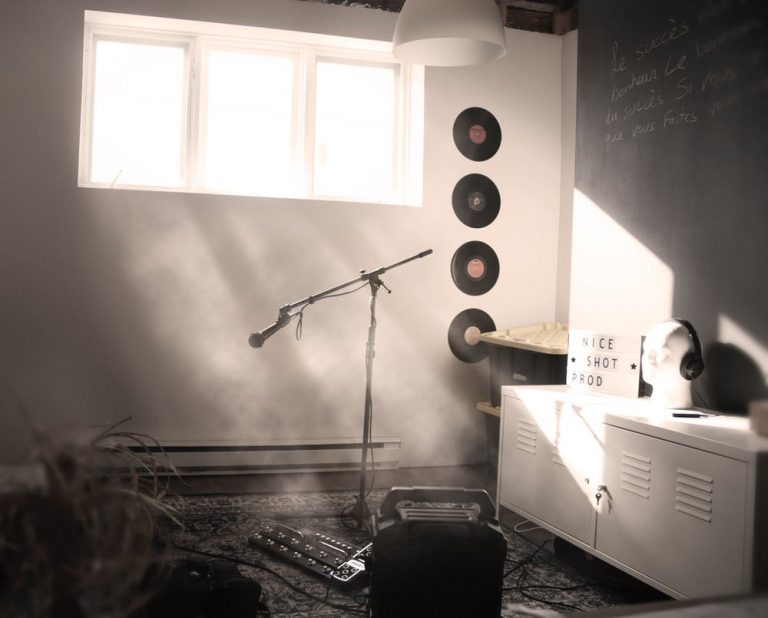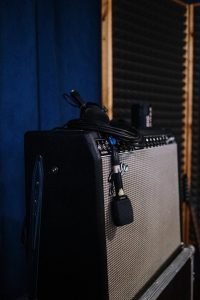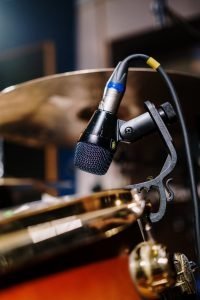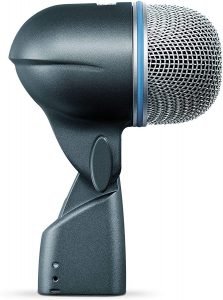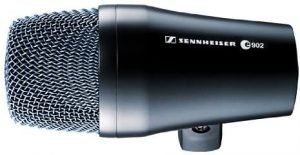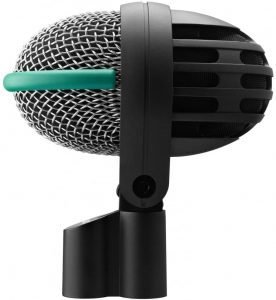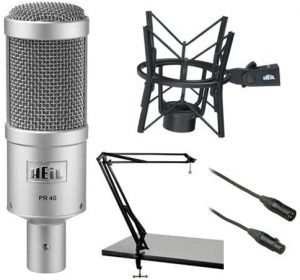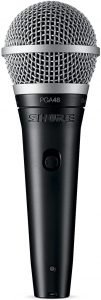A bass amp is like an electric guitar amp, but with some key differences.
As the name suggests, a bass amp is geared towards powering up a bass guitar so that you can play it at high volumes and with massive distortion.
Feedback happens when outside sounds such as your vocals or the audience are picked up by the microphone and sent “backwards” to your amplifier.
The resulting noise is amplified and sent back into the audience or mic where it repeats itself over and over again.
Like anything that a person or thing is built for, instruments and mics are made for specific purposes.
This means that your microphone needs to be matched with the sound your amp is producing.
You need to make sure that the mic is able to pick up both the down-tuned low frequencies of your bass, as well as the up-tuned high frequencies.
If you have a mic that’s not properly matched with your amp, it can potentially cause feedback problems.
Table of Contents
How to Choose a Mic for your Bass Amp
Type of Mic
When finding the right mic for your bass amp, you need first to decide what kind of music you plan on playing most often. For instance, a closed-back dynamic mic is best for more mellow, bass-heavy music like jazz and classical. On the other hand, a condenser mic is better for louder genres like rock or pop.
Frequency Response
The next thing you need to do is research your bass amp’s frequency response. This is probably the trickiest part of selecting a microphone because it’s not something that you can really test out at the local music shop. What you need to do is take a look at the technical specs that came with your amp and go online to look at reviews and videos of similar amps.
Next, you might want to search for professional bass amps that are used by famous guitarists. By seeing how they use their mics in real-life situations, you’ll get a better idea of what kind of mic you should get and how to position it correctly.
Ease of Use
The best mic for a bass amp is one that is matched with the sound you’re producing. You may have luck with certain kinds of mics, but there’s no guarantee that it will completely eliminate feedback or not. It’s really up to the musician and how they position their microphone in relation to their amp.
Miking for Bass Amp
But before we begin, you must first understand that there’s no right or wrong way to mic your amp. Your personal preferences, the environment in which you’re playing and various basses
will all have an impact on how you go about it.
Here’s a list of the main miking techniques for bass amps:
a) Blumlein Pair – This is a classic stereo miking setup that’s very popular among both studio and live engineers because of how flexible it is (Source: aearibbonmics.com).
b) Pairs – Front and Back – This is another classic two-microphone setup. The main differences between it and the Blumlein Pair are that here you will have one mic in front of the speaker stack (typically right below or slightly above the tweeter) and one in the back of the stack (slightly under or slightly behind the speaker).
c) Mono – This one is pretty straightforward. A mono (one-channel) mic will make the sound of your amp more punchy and lively while giving you more control over tone variation.
5 Best Microphones for Bass Amp
1. Shure BETA 52A Supercardioid
The Shure BETA 52A Supercardioid Dynamic Kick Drum Microphone is one of the best performing kick drum mic ever made. This is because it has an adjustable bass-roll off and a supercardioid pickup pattern, providing very tight side rejection. It also has a large diaphragm for rich, round sound with a heavy attack and high SPL capabilities. Many professionals use this mic, and it can be heard on top charting songs to boot!
2. Sennheiser e902
Sennheiser e902 Cardioid Dynamic Mic for Kick Drum is one of the best kick drum mic. It has a tough, professional-looking design with rugged metal housing. The sound is excellent and rich. This particular mic has an internal pop filter, making it perfect for live performances or recording sessions with loud drummers. It also doesn’t pick up as much of the ringing associated with snare drums or toms either.
3. AKG D112 MkII Pro
AKG D112 MkII Professional Bass Drum Microphone is one of the best kick drum mic that comes with a specially designed low-frequency response. It also has a cardioid pickup pattern, providing directed, enhanced bass response. The sound quality is very good, and it can be heard on many hits by top artists. Many professional drummers use this mic, and it is often used for recording sessions as well.
4. Heil Sound PR40
Heil Sound PR40 Dynamic Microphone is also one of the best kick drum mic that comes with a rugged metal housing. The sound quality is very good, and it can be heard on many hits by top artists. This mic has an omnidirectional pattern, providing very good sound with over-heads. Many professional drummers use this mic for recording sessions, and it also comes with a shock mount to protect it from abuse.
5. Shure PGA48-XLR
Shure PGA48-XLR comes with a rugged metal housing. The sound quality is very good, and it can be heard on many hits by top artists. This particular mic has an extra-large diaphragm for rich, round sound with heavy attack and high SPL capabilities. In addition, this mic is recorded in a studio, and it can be used in live performances. So if you want a good instrument microphone for the bass amp, I highly recommend Shure PGA48.
FAQs
Should you mic a bass amp?
The simple answer is: YES! You should definitely be using a mic. (And not doing so will make your bass amp sound terrible.) However, if you don’t know how to use the mic, you could end up with a sound that is worse than not miking the amp at all.
If you are miking a bass amp, it’s typically because you’re looking for more power (volume) or better tone. Mic’ing your amp will allow you to achieve both of these goals, but if you don’t know how to use it properly, then your bass may end up being over-powered in the mix or sound weak and thin.
What mics are good for bass guitar?
A condenser mic is the ideal choice for bass amps. These mics will pick up every sound from your amp, and they will pick up as much of the low frequencies as possible without overloading your signal. This means that you don’t get just a few frequencies, but a wide spectrum of sound that can be sweetened to make it more suited for recording or live use.
What is the best microphone for a bass singer?
A mic with a lot of low end and body (like a large diaphragm condenser) is best for bass. A mic like this will produce lots of sound and can sometimes be used as a vocal mic. For e.g. the Blue Encore series, which are large diaphragm condensers. The Shure KSM32 is another great example of a good bass voice mic.
FAQ:
Q: How to setup a bass amp?
A: The lower your action,the more your bass will buzz. Fret buzz will often not translate through an amplifier. … Don’t set up your bass without getting a good idea of what it’s going to sound like when it’s plugged in. Your ruler is your best friend. … Measure your action at the 3 rd and 17 th fret also.
Q: What is the best small bass amp?
A: Fender Rumble 25 v3 Bass Combo Amplifier (Editor’s Choice) Fender is one of the icons of musical instruments. … Blackstar FLY3 Bass Combo Amplifier. … Peavey Max 126 Bass Combo Amplifier. … Ampeg BA108 Bass Combo Amplifier. … Vox Pathfinder 10 Denim Bass Combo Amplifier. …
Q: What’s the best mic for recording bass guitar?
A: AKG Perception P2 High-Performance Dynamic Bass Microphone. … Audix f6 Dynamic Instrument Microphone. … CAD Audio KBM412 Dynamic Cardioid Microphone. … MXL A-55 Kicker Dynamic Microphone. … Sennheiser e602 II Evolution Series Dynamic Bass Microphone. … Shure BETA 52A Supercardioid Dynamic Microphone. …
Q: What makes a bass amp?
A: Bass amplifiers tend to weigh more than guitar amps. It’s wise to make sure your bass combo or cabinet of choice has sturdy handles and wheels for easy portability. Construction. Bass cabinets vibrate more than any other cabinet, therefore, the construction needs to be solid, and the wood should be thicker. Also, since they tend to be heavy …
